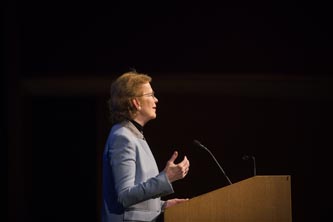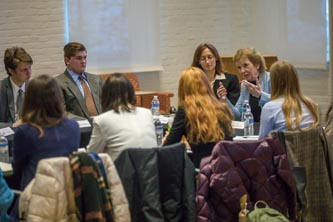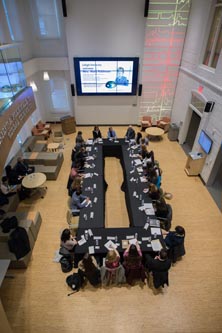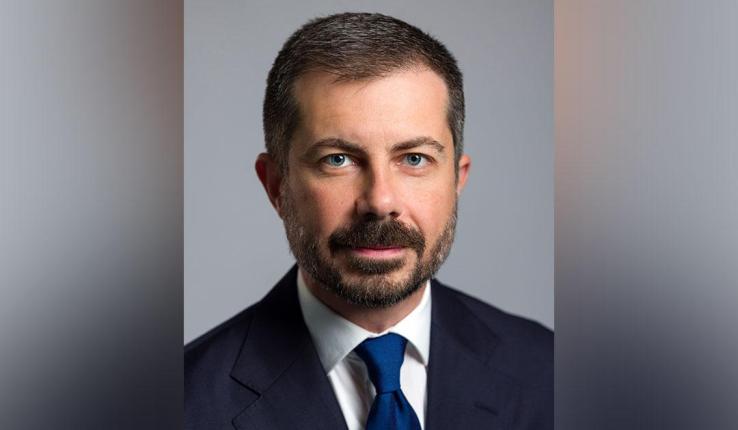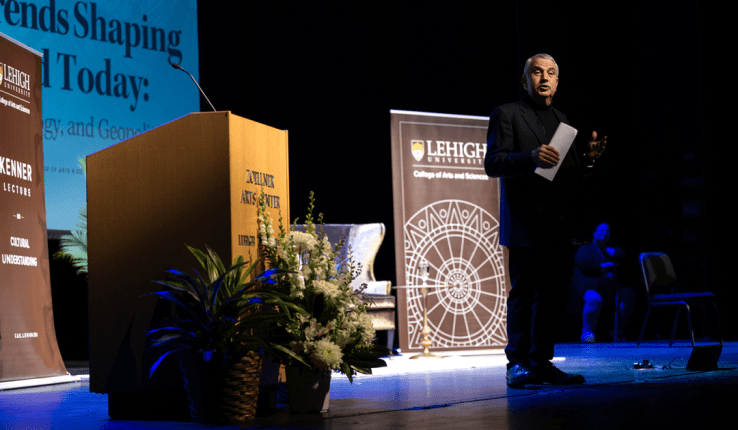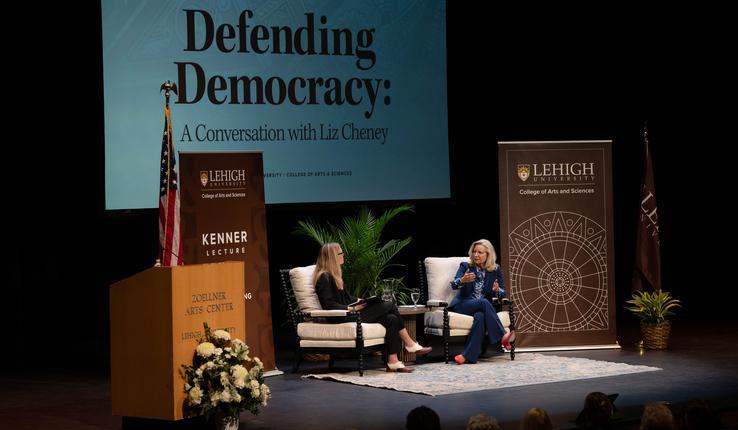Mary Robinson Challenges Lehigh Community to Advocate for Climate Justice
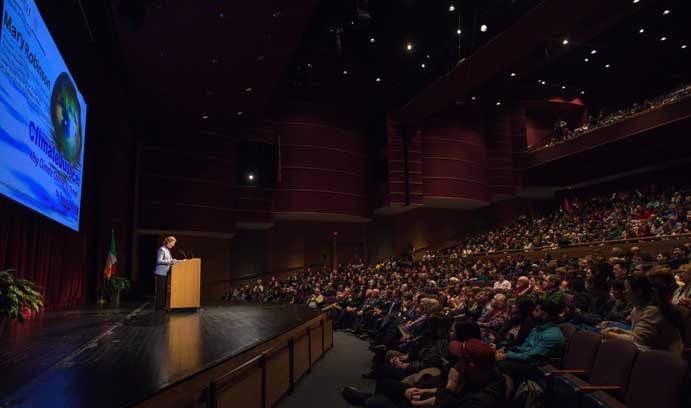
Mary Robinson, the first woman president of Ireland and former United Nations High Commissioner for Human Rights, presented “Climate Justice: Why Climate Change is a Threat to Human Rights,” the 2018 Kenner Lecture on Cultural Understanding.
Mary Robinson uses a well-known historical disaster as an analogy to describe the threat of climate change and its impact on humanity.
“The Titanic went too fast and didn’t pay attention and hit an iceberg. And when it hit that iceberg, it wasn’t just those in steerage, the lower cabins, that drowned. It was those in first class as well,” she told the near-capacity crowd at Baker Hall on Tuesday. “... The way we’re heading [with climate change], it will affect first, and is affecting already, those most vulnerable, those at the edges, those marginalized, those in the indigenous communities, those in the Arctic, those in Alaska in this country. ... But it will eventually—and sooner than we might fear—affect all communities unless we can learn to act.”
Robinson, who has spent much of her career focused on human rights and women’s leadership, now focuses on climate justice, which she said “embodies both parts of a moral argument to act on climate change: Being on the side of those who are suffering most, but also ensuring that they don’t suffer further as the world takes action on climate change, and that they share the benefits of a world powered by renewable energy.”
She issued a challenge to the Lehigh community with regard to climate justice.
“The world needs a groundswell of people equipped with not only the knowledge to devise solutions to the climate crisis, but also vision to see that all people must be included in and empowered by the global response to the great challenges of our time,” said Robinson. “And this is the challenge that you here in Lehigh University must also take up.”
Robinson shared her thoughts on climate justice and how societies worldwide can act during her delivery of the 2018 Kenner Lecture on Cultural Understanding.
The Kenner Lecture Series in the College of Arts and Sciences was endowed by Jeffrey L. Kenner ’65. Kenner, who studied industrial engineering and business administration at Lehigh, established the lecture series in 1997. After a career as a management consultant with PricewaterhouseCoopers (then Price Waterhouse & Co.), he became involved in leveraged buyouts and venture capital. In 1986, Kenner formed his own firm, Kenner & Co. Inc. He served as a university trustee from 1995-2002, has long been a member of the university's Asa Packer and Tower Societies, and is a member of Leadership Plaza.
Robinson was elected the seventh President of Ireland in 1990 and served until 1997, when she became UN High Commissioner for Human Rights, a role she maintained until 2002. Robinson was elected Chancellor of Trinity College in 1998 and later founded and served as president of Realizing Rights: The Ethical Globalization Initiative from 2002-2010. She has worked on climate-related issues around the world, and in 2010 founded and began her tenure as president of the Mary Robinson Foundation—Climate Justice. Robinson was the UN Secretary-General’s Special Envoy to the Great Lakes Region of Africa from March 2013 to August 2014, and from August 2014 through December 2015 served as the UN Secretary-General’s Special Envoy on Climate Change. Most recently, United Nations Secretary-General Ban Ki-moon in 2016 appointed Robinson as one of two Special Envoys on El Niño and Climate.
Witnessing the Injustice of Climate Change
Donald Hall, dean of the College of Arts and Sciences, introduced Robinson.
“Mrs. Robinson’s background and expertise is a perfect fit for the Kenner Lecture,” said Hall. “She is the first woman President of Ireland and more recently United Nations High Commissioner for Human Rights, and has spent most of her life as a human rights advocate. She is the superb example of a politician who puts her humanity very much at the forefront of her politics.”
Robinson described how, as UN High Commissioner of Human Rights, she met and heard the stories of women from agricultural communities in countries like Rwanda, Liberia and Malawi. The stories, she said, were the same.
“‘The seasons are changing. The rains don’t come as they used to. We can’t predict the weather. Will it be a long drought or will it be flooding?’” Robinson recalled the women saying. “Communities no longer knew when to plant and when to harvest. These shifting seasons were having disastrous impacts on their food security and resilience. The changing climate really undermines development in poor communities that are vulnerable to climate changes. In listening, the great injustice became clear to me.”
The changing climate, said Robinson, undermines development in poor communities, which feel the impacts first and most intensely. These communities, she said, have the least amount of responsibility for the crisis, as well as the least capacity to respond or adapt to it. Robinson emphasized the need for world leaders to listen to those experiencing the impacts of climate change and take action.
She told the story of a friend from the Carteret Islands, located near Papua New Guinea, where rising sea levels have forced the local community to move. The friend, Robinson said, has worked to transition her community to mainland Papua New Guinea, a necessary but heart-wrenching move.
“I see the pain in her eyes when she says, ‘But there’s nothing I can do about the fact that we have to move from the land of the bones of our ancestors,’” Robinson said. “The land of the bones of our ancestors. For an indigenous people, that is really hard because that’s actually their spiritual connection with the bones of their ancestors, with the land, how they see themselves, how they pray. … It’s important that we understand those who are working so hard to try to cope with these shocks to their communities, and it speaks to the capacity of people to rise above adversity with dignity and courage. And we should in many ways take heart from their example.”
Leadership and Solidarity
“Climate justice,” said Robinson, “is the antithesis to the rise of populism and the resulting myopic, inward-looking decision-making.”
All nations are interdependent, she said, and the threat of climate change “confronts us with our global interdependence.”
The Paris Climate Agreement, an agreement adopted by world leaders in December 2015 that addresses greenhouse gas emissions mitigation, adaptation and finance, aims “to hold the increase in the global average temperature to well below 2 degrees Celsius above pre-industrial levels” and work to “limit the temperature increase to 1.5 degrees Celsius above pre-industrial levels.”
The commitments to take action on climate change made by most countries prior to the Paris Agreement are insufficient, Robinson said. “They leave us on a pathway to at least 3 degrees Celsius of warming above pre-industrial standards. And that pathway is a pathway to catastrophe.”
When President Donald Trump announced that he would pull the United States out of the Paris Climate Agreement, said Robinson, “the response [of the public] was dynamic.” She referenced the declaration titled “We Are Still In,” signed by more than 2,500 American leaders in government, businesses and higher education committed to tackling climate change and upholding the Paris Agreement.
Robinson also discussed the significance of the United Nations’ 2030 Agenda for Sustainable Development, a negotiated text that sets 17 sustainable development goals for more than 190 countries seeking “‘a world of universal respect for human rights and human dignity, the rule of law, justice, equality and nondiscrimination, of respect for race, ethnicity and cultural diversity and equal opportunity, permitting the full realization of human potential and contributing to shared prosperity.”
These goals, Robinson said, are not meant to apply only to developing countries. All countries, she said, have a responsibility.
“We all have to learn that we need to become more sustainable. We need to live in harmony and not be abusing the boundaries of our world and abusing the capacity of our world to continue to sustain us. We cannot have peaceful and prosperous societies without taking urgent action on climate change,” she said.
The challenge, however, is not only about reducing the use of fossil fuels.
“Avoiding the most devastating impacts of climate change while enabling development for all people is a greater challenge,” she said, “because the overriding priority of developing countries is the development of their people, bringing their people out of poverty.”
There arises the issue of energy access. Robinson explained that 1.2 billion people have no access to electricity.
“Energy is the engine of development. It brings the life-transforming benefits: lighting for schools, functioning health clinics, pumps for water and sanitation, cleaner indoor air due to a decrease in cooking over open fires, and greater income-generating opportunities. It’s imperative that all people have access to productive energy. It’s apparent that if traditional fossil-fuel-based generation of energy is used to provide electricity for those currently living in energy poverty, the remaining carbon budget will be rapidly depleted. However, if affordable sustainable alternatives aren’t made available to developing countries, developing countries will turn to fossil fuels as the only option available to them. And who could blame them?”
Developed countries, said Robinson, cannot rely on poorer countries to refrain from fossil fuel use to combat climate change. Developed countries instead should provide less developed countries with realistic alternatives. This requires all countries to work together “to enable an inclusive transition to a safer and more prosperous future for all.”
‘A Radical and Just Transition of Our Societies’
Universities play a special role in advocating climate justice, Robinson said, and individuals can make an impact regardless of what they study, as the problems we face require a wide range of expertise.
“Stabilizing the climate and charting a course for a safer world with opportunity for all will require innovation, not just in science and technology, but also in our lifestyles, our living systems, our business practices, the way we farm, the way we run our cities, the way we communicate, the list goes on. For the road ahead, we need good people with the means to do good things. ... Averting climate change isn’t simply a matter of ending our addiction to fossil fuels. It requires a radical and just transition of our societies and it will be you and others like you who bring about the change we need to see in the world.
“The green revolution will be driven by those young minds that can grapple with the complexity of the challenges we face and devise solutions that are borne out of a sense of empathy and fairness as much as they are by technical skills and knowledge and know-how. If we don’t base our solutions in empathy, then we’re likely to fail in our efforts to hand on a safe world to future generations where they can live with dignity and equality. The education from which you are benefitting is, as I think you’re aware, a privilege afforded to a relative few. With this privilege comes a responsibility to find ways to apply your learning for the betterment of humanity. I know this is very much a part of the ethos and spirit of Lehigh University.”
Robinson challenged all those in attendance to take responsibility and consider climate justice in their personal lives and actions. She concluded by quoting a passage from an op-ed titled “Thank You, Mr. Trump,” written by her Bangladeshi friend, Saleemul Huq, in the Dhaka Tribune.
“‘This is perhaps the most powerful aspect of the Paris Agreement, in that it links every citizen on the planet in a common enterprise with a common goal, with heads of states only the signatories on behalf of the people. The ball has been taken up by the people and no head of state can take it back—not even President Trump,’” Robinson read aloud.
“So the climate change ball is in your court now,” she concluded. “Run with it. Run with it hard and in doing so, make sure that the United Stages changes from being somewhat of a laggard to the leader on climate justice that you can all be proud of.”
Photos by Christa Neu
Posted on:


